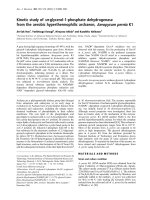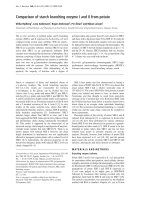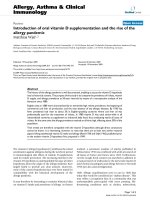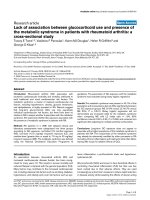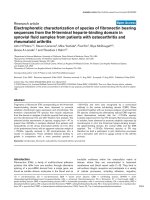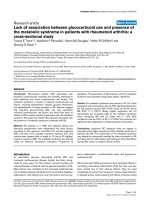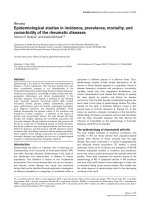Báo cáo y học: "introduction to special issue on Eye and Zoonosis – from the guest editors"
Bạn đang xem bản rút gọn của tài liệu. Xem và tải ngay bản đầy đủ của tài liệu tại đây (128.98 KB, 2 trang )
Int. J. Med. Sci. 2009, 6
116
I
I
n
n
t
t
e
e
r
r
n
n
a
a
t
t
i
i
o
o
n
n
a
a
l
l
J
J
o
o
u
u
r
r
n
n
a
a
l
l
o
o
f
f
M
M
e
e
d
d
i
i
c
c
a
a
l
l
S
S
c
c
i
i
e
e
n
n
c
c
e
e
s
s
2009; 6(3):116-117
© Ivyspring International Publisher. All rights reserved
Editorial
Introduction to special issue on Eye and Zoonosis – from the guest editors
Jelka G. ORSONI and Paolo MORA
Inflammatory and Autoimmune Ocular Diseases Service - Institute of Ophthalmology - University of Parma - Italy
Correspondence to: Dr. Paolo MORA, Inflammatory and Autoimmune Ocular Diseases Service - Institute of Ophthal-
mology - University of Parma – Italy. E-mail:
Published: 2009.03.19
Abstract
Papers of this special issue are based on the presentations given in the Congress “Eye and
Zoonosis” - October 10-11
th
2008, Parma (Italy). This issue aims to provide researchers
with timely update on a number of important topics on Zoonosis in Ophthalmology.
On the occasion of the first International Con-
gress on Ocular Zoonoses held in Lausanne, Switzer-
land in 2006, we were asked by the promoter, Dr. Yan
Guex-Crosier, to organize the second Congress in
Parma, Italy. It was a great pleasure for us to accept
this invitation.
We do believe that every ophthalmologist cop-
ing with inflammatory eye diseases, either because
specifically working on inflammation or because in-
flammation has been observed by chance during an
ocular examination performed for other purposes,
must be aware of zoonotic diseases that affect the eye.
This Congress held in Parma during two
half-day sessions could not cover all zoonoses; con-
sequently, only those most frequently observed in the
European/Mediterranean area were dealt with.
Zoonoses may be imported by immigrants, who
represent a relatively recent phenomenon in Italy; but
also travellers coming back from endemic areas are
transmitting diseases hitherto unknown or forgotten
in our own countries. Moreover, it must be remem-
bered that our domestic animals can also be trans-
mitters of zoonoses. If our pets, such as dogs and cats,
are correctly cared for, they will not represent a res-
ervoir for ticks, fleas and other potential vectors.
Ocular zoonoses can no longer be ignored; every
ophthalmologist, working on his own or in a public
institution must remember that a red eye or a vitriitis
or retinitis without any current explanation might be
due to a disease transmitted by arthropod vectors
from foreign countries or by animals.
Correct information on this subject will prove
extremely useful to our patients, avoiding severe
consequences of ocular function.
Contents of this special issue are based on the
presentations given in the Congress “Eye and Zoono-
sis” - October 10-11
th
2008, Parma (Italy). They in-
clude:
• Incidence of ocular Zoonoses referred to the In-
flammatory and Autoimmune Ocular Diseases
Service of the University of Parma (Italy)
• Introduction into Pathology of Ocular Zoonoses
• Local epidemiology and clinical manifestations
of Lyme disease
• Ocular manifestations of Lyme borreliosis in
Europe
• Ocular manifestations of Rickttesiosis: 1. Medi-
terranean Spotted Fever: laboratory analysis and
case reports
• Ocular manifestations of Rickttesiosis: 2. Retinal
involvement and treatment
• Ocular Toxocariasis
• Ocular Bartonellosis
• Human toxoplasmosis and the role of veterinary
clinicians
• Laboratory diagnosis of Toxoplasma gondii in-
fection
• Congenital and acquired Toxoplasmosis (The
content of Dr Brezin's presentation has been
published in the December 2008 issue of the
Int. J. Med. Sci. 2009, 6
117
American Journal of Ophthalmology: Delair E,
Monnet D, Grabar S, Dupouy-Camet J, Yera H,
Brézin AP. Respective roles of acquired and con-
genital infections in presumed ocular toxoplas-
mosis. Am J Ophthalmol 2008;146:851-5).
• Optical Coherence Tomography in ocular
toxoplasmosis
• Usefulness of vitrectomy in the treatment of
ocular toxoplasmosis
• Update on the treatment of ocular toxoplasmo-
sis.
We hope that this special issue will be interesting
to readers and provides researchers with timely up-
date on various topics in this important field.
Conflict of Interest
The authors have declared that no conflict of in-
terest exists.


